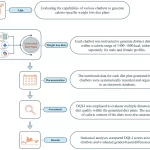Byline: January 10, 2025
A groundbreaking study from Stanford Medicine has revealed how a fiber-rich diet not only promotes general health but also influences gene function in ways that could help combat cancer. Published in Nature Metabolism on January 9, the research identifies the direct epigenetic effects of short-chain fatty acids—key byproducts of fiber digestion—and links them to anti-cancer actions.
Despite its well-documented health benefits, fiber remains woefully absent from most American diets. Less than 10% of Americans meet the minimum recommended intake, according to recent estimates. However, the findings of this study may provide a compelling reason to prioritize fiber-rich foods like beans, nuts, cruciferous vegetables, and avocados.
Fiber and Its Epigenetic Effects
When consumed, fiber undergoes fermentation by gut microbiota, producing short-chain fatty acids such as propionate and butyrate. These compounds, long recognized for their role in metabolism, have now been shown to directly influence gene expression.
The Stanford team explored how these acids impact gene regulation in human cells, colon cancer cells, and mouse intestines. Their findings revealed significant epigenetic changes at genes responsible for cell proliferation, differentiation, and apoptosis (programmed cell death)—processes crucial for controlling cancerous growth.
“We found a direct link between eating fiber and modulation of gene function that has anti-cancer effects, and we think this is likely a global mechanism,” said Michael Snyder, Ph.D., the study’s senior author and Stanford W. Ascherman, MD, FACS Professor in Genetics. “The short-chain fatty acids resulting from fiber digestion can travel throughout the body, affecting many tissues.”
Implications for Cancer Prevention and Treatment
This discovery comes at a critical time, as rates of colon cancer in younger adults continue to rise. By pinpointing the gene targets of propionate and butyrate, the research opens doors for potential dietary interventions and enhanced cancer therapies.
“By identifying the gene targets of these important molecules, we can understand how fiber exerts its beneficial effects and what goes wrong during cancer,” Snyder explained.
The study also underscores a broader issue: the fiber-deficient modern diet. “Most people’s microbiomes are not being fed properly, which limits the production of short-chain fatty acids,” Snyder added. “This is not doing our health any favors.”
A Call to Action
The findings emphasize the critical need for a dietary shift. Increasing fiber intake could support a healthier gut microbiome, enhance gene regulation, and potentially reduce cancer risk.
For those seeking to boost their fiber consumption, simple steps like incorporating legumes, whole grains, and vegetables into daily meals could pave the way for better long-term health—at the molecular level.
Study Details
The study, titled Short-chain fatty acid metabolites propionate and butyrate are unique epigenetic regulatory elements linking diet, metabolism, and gene expression, is available in Nature Metabolism.
DOI: 10.1038/s42255-024-01191-9
Journal: Nature Metabolism
With these insights, the research reinforces the age-old adage: you are what you eat—right down to your genes.











